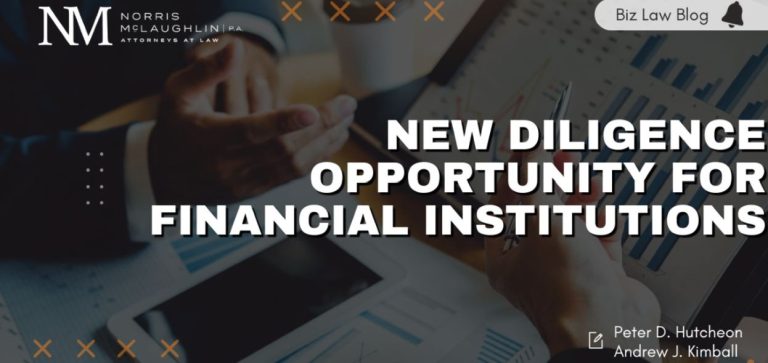Visit the CTA Reference Center to receive the latest updates on the Corporate Transparency Act. Click here!
Visit the CTA Reference Center to receive the latest updates on the Corporate Transparency Act. Click here!
Submitted by UCS on February 14, 2024

In this guest blog post, we present an article authored by Andrew J. Kimball, an Associate at Norris McLaughlin, P.A., and Peter D. Hutcheon, Of Counsel at the same firm. The article delves into the necessary measures that financial institutions must undertake to obtain the beneficial ownership information housed by FinCEN under the Corporate Transparency Act. This article was originally published on January 22, 2024 on the website of Norris McLaughlin P.A.
On Jan. 1, 2024, the Corporate Transparency Act (“CTA”) took effect. As a result, all business entities, unless expressly exempt by the CTA, must file Reports of Beneficial Ownership Information (“BOI”) with the Financial Crimes Enforcement Network (“FinCEN”), a unit of the U.S. Treasury. Under the CTA, “financial institutions,” i.e., banks and other entities that provide financings and are subject to the “Know Your Customer” and “Customer Due Diligence” regulations of FinCEN pursuant to the Bank Secrecy Act, the USA Patriot Act, and the Anti-Money Laundering Act of 2020, may access the BOI on reports filed with FinCEN.
To gain access to the BOI, the financial institution MUST:
i) Obtain the written consent of the customer, i.e., the borrower, guarantor, or other loan party, in connection with the diligence process required before entering a business relationship with the customer, or as part of the continuing diligence required in an existing relationship.
Accordingly, forms used by the financial institution to open or to continue an existing business relationship must include a clear and conspicuous provision in which the customer gives consent. This will probably require a complete review and revision of those forms;
ii) Determine that obtaining access to the BOI is reasonably necessary for the financial institution to meet its diligence obligations. That determination should be spelled out in the written request to FinCEN for access; and
iii) Acknowledge the scope of confidentiality obligations with respect to the BOI obtained, including the limited use permitted of the information, as well as safeguarding that accessed BOI from misuse.
Financial institutions should be prepared to request access to BOI as a matter of course. In any case where a customer engages in violative activity, and the BOI would have alerted the financial institution to possible risks, that institution could be exposed to sanctions by its principal prudential regulator and/or by other law enforcement agencies.
About the authors
Andrew J. Kimball is an associate in the firm’s New Jersey office and a member of the firm’s Business Law Practice Group. Andrew focuses his practice on the representation of sponsors, borrowers, lenders, search funds and buyers in connection with debt financing transactions. He regularly advises clients on acquisition financings, loan commitments, and other secured and unsecured lending transactions.
Peter D. Hutcheon practices primarily in the areas of business governance, commercial transactions, securities, banking, and finance. Peter counsels management of public and private companies and banking institutions on governance matters. He is an expert on indemnification and insurance issues affecting directors and officers and has represented parties in major public-private partnership financing.
Business attorneys at Norris McLaughlin, P.A. are prepared to assist financial institutions to review their existing forms and revise them to allow for obtaining the needed consent to access BOI, and to develop documentation for use in requesting the BOI from FinCEN. If you have any questions concerning BOI Reporting, CTA, or any other business law needs, please do not hesitate to reach out to Andrew J. Kimball at ajkimball@norris-law.com or Peter D. Hutcheon at pdhutcheon@norris-law.com.

Written by Our Team
United Corporate Services (“UCS”) provides registered agent services in all 50 states and U.S. territories as well as in select international jurisdictions. With 50 plus years of experience in the legal services industry, UCS partners you with a highly skilled staff of Client Service Representatives who can help with navigating through the complexities of forming and maintaining companies for yourself or your client.
Related Posts
September 18, 2024
In a recent update shared by the NYS Franchise Tax Search Unit, effective August 15, 2024, UCS will no longer process New York State (NYS) Franchise Tax searches. This significant change impacts how businesses will access critical...
Read Full PostMarch 15, 2024
In 2019, a new regulation was implemented in Canada, mandating federally incorporated, privately held companies incorporated under the Canada Business Corporations Act (CBCA) to establish and maintain comprehensive records of in...
Read Full PostJanuary 5, 2024
Our guest blog post showcases an article authored by Jonathan Wilson, a co-founder of FinCEN Report Company LLC. Originally published on December 24, 2023, the article offers a comprehensive overview of the Access Rule under the C...
Read Full Post